| Srl | Item |
| 1 |
ID:
092361
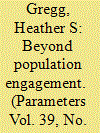

|
|
|
| 2 |
ID:
098250
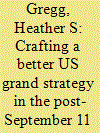

|
|
|
|
|
| Publication |
2010.
|
| Summary/Abstract |
This article compares the instruments of statecraft used to construct grand strategies in the early years of the Cold War-the Truman and Eisenhower administrations-with the Bush administration's grand strategy and the Global War on Terror (GWOT). It argues that the Bush strategy relied heavily on the military instrument of statecraft in attempts of defeating Al-Qaeda and did not develop robust and concerted diplomatic, psychological and economic tools to undermine Al-Qaeda's ideology and influence. The early days of the Cold War hold valuable lessons for crafting an integrated grand strategy that can fight both the Al-Qaeda network and its ideology.
|
|
|
|
|
|
|
|
|
|
|
|
|
|
|
|
| 3 |
ID:
087394
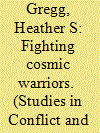

|
|
|
|
|
| Publication |
2009.
|
| Summary/Abstract |
This article argues that a successful strategy for fighting the Global War on Terror (GWOT) requires actions aimed not only at defeating the Al Qaeda network and denying its operatives sanctuary, but also efforts to delegitimize Al Qaeda's ideology; the United States has focused on the former at the expense of the latter. The GWOT requires a new strategy, one that continues to target Al Qaeda operatives and their assets, while undermining Al Qaeda's message. This requires a better understanding of Al Qaeda's ideology, how U.S. foreign policy may fuel that ideology, and a strategy for undermining militant Islam's worldview.
|
|
|
|
|
|
|
|
|
|
|
|
|
|
|
|
| 4 |
ID:
095298
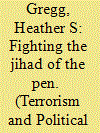

|
|
|
|
|
| Publication |
2010.
|
| Summary/Abstract |
Al Qaeda's ideology is not new; their critique of the existing political and social order and vision for how to redeem the Muslim world builds on preexisting arguments of several 20th century predecessors who called for an Islamic revolution that would create a new order based on Islam. The persistence of revolutionary Islam suggests that these ideas need to be countered in order to strike at the root of the problem driving Islamically motivated terrorism and insurgency. U.S. efforts to defeat Al Qaeda, however, continue to focus primarily on killing or capturing the leadership, interdicting operations, and defensively bolstering the homeland and U.S. assets against various types of attacks. In order to confront Al Qaeda's ideology, U.S. efforts should focus on indirectly fostering "a market place of ideas"-the space and culture of questioning and debating-in order to challenge the grievances and solutions proposed by revolutionary Islam.
|
|
|
|
|
|
|
|
|
|
|
|
|
|
|
|
| 5 |
ID:
173838
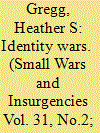

|
|
|
|
|
| Summary/Abstract |
Collective identity building is a critical component of most insurgent movements, including constructing a compelling cause with which individuals can identify and a sense of purpose and camaraderie. Counterinsurgencies, by contrast, devote surprisingly little attention to creating identities that compete with insurgents. Instead, they tend to focus on providing goods and services to vulnerable populations with the assumption that emotional resources, such as a sense of identity and purpose, are not necessary. This article draws from theoretical work on identity building to outline how collective identities are constructed, what they include, and how they shape human behavior. It then considers the U.S. led operations in Iraq from 2003–2011, and compares these efforts to the emergence of Sunni Islamist insurgencies in Iraq to investigate how insurgents used identity building, but counterinsurgents did not. It then applies this theoretical literature to construct a program for how counterinsurgents could include identity construction as part of its strategy to undermine insurgent movements.
|
|
|
|
|
|
|
|
|
|
|
|
|
|
|
|
| 6 |
ID:
107901
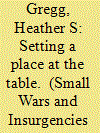

|
|
|
|
|
| Publication |
2011.
|
| Summary/Abstract |
This article argues that, under certain conditions, allowing insurgents into the political process - through elections or government posts - can be a useful tool in the peace process and can help end insurgencies. However, bringing insurgents into the political process is unlikely to end insurgencies on its own, particularly if insurgents, the government, or the population believes that force is still a viable means of defeating the opponent and changing the status quo. The article begins with a brief overview of the causes of insurgency and on conflict resolution for internal wars. The article then considers two examples of insurgents that have entered the political process - the Irish Republican Army (IRA) in Northern Ireland and Hezbollah in Lebanon - and the differing degrees of success in transforming these insurgents to non-violent participants in the political process. It concludes by suggesting how insurgents can be brought into the political process as part of conflict resolution and the implications for Afghanistan.
|
|
|
|
|
|
|
|
|
|
|
|
|
|
|
|